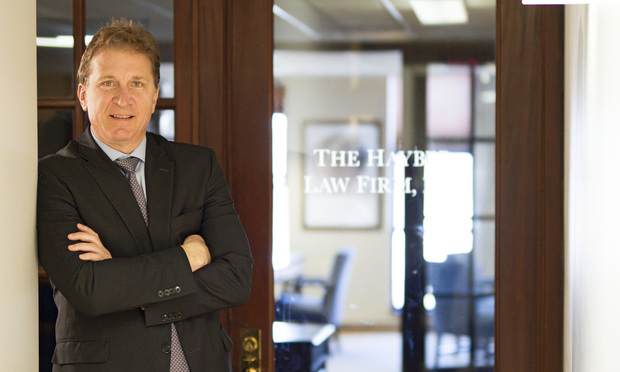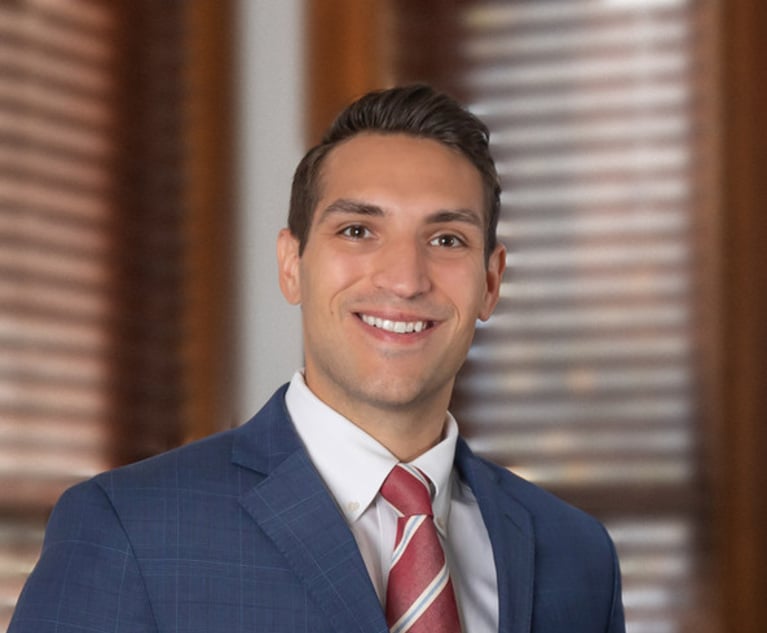Defense: Attorney Fee Award in Wage Case Could Mean 'Open Season' for Suits Against Restaurants
Attorneys for Vito's By The Water restaurant said they are leaning toward appealing a Superior Court judge's ruling that states the eatery did not properly pay one of its workers under a law governing wages for employees earning tips.
May 21, 2018 at 07:40 PM
5 minute read
 Richard Hayber of the Hayber Law Firm in Hartford.
Richard Hayber of the Hayber Law Firm in Hartford.
A ruling by a Connecticut Superior Court judge on minimum wage law is getting mixed reaction from attorneys on both sides of the issue.
The ruling by Hartford Superior Court Judge Cesar Noble giving $31,445 to an attorney who worked on a tip credit employment case was hailed by the attorney as a major incentive for plaintiff's counsel to take on such cases. But the defense decried the ruling as unjust, unfair and inappropriate.
The litigation hinged on “tip credit”—the difference between the minimum fair wage under Connecticut's Minimum Wage Act and the minimum wage permitted for service employees who receive gratuities. It pits plaintiff Shaneque Stevens against Windsor-based Italian restaurant Vito's By The Water, and resulted in two rulings from Noble.
The latest ruling, on May 17, granted the plaintiff $31,445 in legal fees for work by attorney Richard Hayber of the Hayber Law Firm in Hartford. An earlier ruling in November found the restaurant did not pay fair and just wages to Stevens, a former server. At the time, the judge awarded Stevens $20,704.
“This is an important ruling for attorneys who take on wage cases for low-wage workers that they will be paid when they win,” said Hayber, a labor/employment lawyer in Connecticut and Massachusetts for 20 years. “This will encourage lawyers to help otherwise resourceless workers who need their help. It's a big incentive for those lawyers to take on these cases.”
But defense counsel took the opposite view.
Kennelly Law Firm attorney John Kennelly, who represents Vito's owner Robert Maffucci, said both rulings set a dangerous precedent and will negatively affect restaurants across the state.
Kennelly called the attorneys fee award given to Hayber “inappropriate.”
“The amount of repetitive billing should not have been rewarded by this court. I believe $32,000 was way too much,” he said. “My motion was for him to get about $10,000 for a case with some minor and legal factual disputes.”
Kennelly said he is leaning toward appealing and has until June 3 to decide. He said Maffucci has yet to make a final decision on whether to appeal. The restaurateur did not return a call for comment Monday.
The November ruling ”means there is now an open season for every small restaurant business that does not have an entire legal department to protect them from the minutia of the state Department of Labor regulations,” Kennelly said.
In that ruling, Noble stated that Vito's paid Stevens solely a tip credit wage when some of her work should have been paid at the state's $10.10-an-hour minimum wage. The tip credit wage in Connecticut is $6.38 an hour, or $3.72 less than the minimum wage. State law allows for restaurant wait staff to be paid the tip credit wage if they are serving customers and earning tips. Employees must, under state law, get the state's minimum wage when they are not serving, such as times they are vacuuming or rolling silverware or cleaning pizza trays.
According to Hayber, Stevens and others servers, on average, would work about 30-35 hours a week. Of that time, Hayber said, about five hours a week should have been earmarked for minimum wage pay. That is disputed by Kennelly, who said minimum wage pay constituted only a few minutes each day.
“We are talking only a few minutes in the beginning and the end of the shift,” Kennelly told the Connecticut Law Tribune Monday. “That is when [Stevens] was doing things like setting up and filling condiments. We are talking about a minor violation here. We are talking about minutes. It was all done on good faith and was not nefarious. There are not conspiracies here. What the court has done is applied what is significant punitive damages to a situation that, at the very worst, was ignorance of application of the tip credit rate.”
Kennelly said the most unfair part of the November ruling was that the judge “applied double damages” for the plaintiff.
But Hayber said the judge's action might deter other restaurants from doing what Vito's allegedly did.
In addition to awarding his client back pay for about 18 months, Hayber noted Noble also tacked on 12 percent interest per year.
“The penalty damages under the Connecticut Wage Act are designed to punish and deter this type of activity in Connecticut,” Hayber said. “This ruling is very important because it strictly construes the Wage Act, which is designed to help protect low-wage workers from employers who would take advantage of their status as employees.”
Hayber, who said he plans to file similar suits in the near future against other restaurants, described his lawyering style in the case as “relatively straightforward.”
“I obtained the payroll records and side-work lists and took the deposition of the owner, who testified truthfully that [Stevens] performed side work at the beginning and end of her shift and he paid her at the service rate. That was the end of the case for me.”
While the ruling might not set precedent because Superior Court judges do not have to follow what a fellow Superior Court judge ruled, Hayber suggested it might influence other decisions.
Judges “do read each other's opinions and try to follow them,” he said. “They are not bound to them, but judges try to create a cohesive body of law.”
This content has been archived. It is available through our partners, LexisNexis® and Bloomberg Law.
To view this content, please continue to their sites.
Not a Lexis Subscriber?
Subscribe Now
Not a Bloomberg Law Subscriber?
Subscribe Now
NOT FOR REPRINT
© 2025 ALM Global, LLC, All Rights Reserved. Request academic re-use from www.copyright.com. All other uses, submit a request to [email protected]. For more information visit Asset & Logo Licensing.
You Might Like
View All

Apple Disputes 'Efforts to Manufacture' Imaging Sensor Claims Against iPhone 15 Technology
Trending Stories
- 1Supreme Court Upholds Law Requiring TikTok's Divestiture Or Shutdown
- 2The 'Substantial Certainty' of Employer Liability Policies
- 3Morgan Lewis Shutters Shenzhen Office Less Than Two Years After Launch
- 4Litigating the Written Word: Parol Evidence Rule and the Gist of the Action Doctrine in Fraud Claims
- 5Why Wait? Arbitrate! The Value of Consenting to Arbitrate Your SUM Cases at NAM
Who Got The Work
J. Brugh Lower of Gibbons has entered an appearance for industrial equipment supplier Devco Corporation in a pending trademark infringement lawsuit. The suit, accusing the defendant of selling knock-off Graco products, was filed Dec. 18 in New Jersey District Court by Rivkin Radler on behalf of Graco Inc. and Graco Minnesota. The case, assigned to U.S. District Judge Zahid N. Quraishi, is 3:24-cv-11294, Graco Inc. et al v. Devco Corporation.
Who Got The Work
Rebecca Maller-Stein and Kent A. Yalowitz of Arnold & Porter Kaye Scholer have entered their appearances for Hanaco Venture Capital and its executives, Lior Prosor and David Frankel, in a pending securities lawsuit. The action, filed on Dec. 24 in New York Southern District Court by Zell, Aron & Co. on behalf of Goldeneye Advisors, accuses the defendants of negligently and fraudulently managing the plaintiff's $1 million investment. The case, assigned to U.S. District Judge Vernon S. Broderick, is 1:24-cv-09918, Goldeneye Advisors, LLC v. Hanaco Venture Capital, Ltd. et al.
Who Got The Work
Attorneys from A&O Shearman has stepped in as defense counsel for Toronto-Dominion Bank and other defendants in a pending securities class action. The suit, filed Dec. 11 in New York Southern District Court by Bleichmar Fonti & Auld, accuses the defendants of concealing the bank's 'pervasive' deficiencies in regards to its compliance with the Bank Secrecy Act and the quality of its anti-money laundering controls. The case, assigned to U.S. District Judge Arun Subramanian, is 1:24-cv-09445, Gonzalez v. The Toronto-Dominion Bank et al.
Who Got The Work
Crown Castle International, a Pennsylvania company providing shared communications infrastructure, has turned to Luke D. Wolf of Gordon Rees Scully Mansukhani to fend off a pending breach-of-contract lawsuit. The court action, filed Nov. 25 in Michigan Eastern District Court by Hooper Hathaway PC on behalf of The Town Residences LLC, accuses Crown Castle of failing to transfer approximately $30,000 in utility payments from T-Mobile in breach of a roof-top lease and assignment agreement. The case, assigned to U.S. District Judge Susan K. Declercq, is 2:24-cv-13131, The Town Residences LLC v. T-Mobile US, Inc. et al.
Who Got The Work
Wilfred P. Coronato and Daniel M. Schwartz of McCarter & English have stepped in as defense counsel to Electrolux Home Products Inc. in a pending product liability lawsuit. The court action, filed Nov. 26 in New York Eastern District Court by Poulos Lopiccolo PC and Nagel Rice LLP on behalf of David Stern, alleges that the defendant's refrigerators’ drawers and shelving repeatedly break and fall apart within months after purchase. The case, assigned to U.S. District Judge Joan M. Azrack, is 2:24-cv-08204, Stern v. Electrolux Home Products, Inc.
Featured Firms
Law Offices of Gary Martin Hays & Associates, P.C.
(470) 294-1674
Law Offices of Mark E. Salomone
(857) 444-6468
Smith & Hassler
(713) 739-1250












